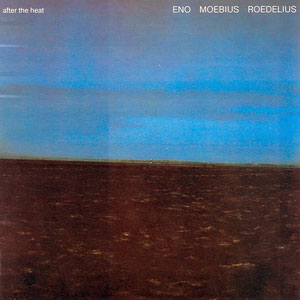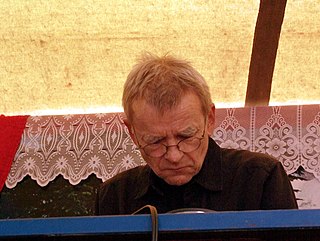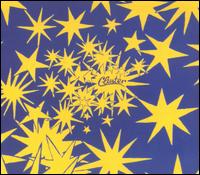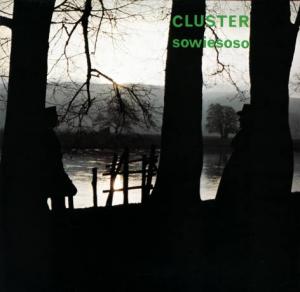
Cluster & Eno is a collaborative album by German electronic music group Cluster and English ambient musician Brian Eno. The style of this album is a collection of gentle melodies: a mixture of Eno's ambient sensibilities and Cluster's avant-garde style.

Cluster were a German musical duo consisting of Hans-Joachim Roedelius and Dieter Moebius, formed in 1971 and associated with West Germany's krautrock and kosmische music scenes. Born from the earlier Berlin-based group Kluster, they relocated in 1971 into the countryside village of Forst, Lower Saxony, where they built a studio and collaborated with musicians such as Conny Plank, Brian Eno, and Michael Rother; with the latter, they formed the influential side-project Harmonia. After first disbanding in 1981, Cluster reunited several times: from 1989 to 1997, and from 2007 to 2010.

Harmonia was a West German musical "supergroup" formed in 1973 as a collaboration between members of two prominent krautrock bands: Cluster's Hans-Joachim Roedelius and Dieter Moebius joined by Neu! guitarist Michael Rother. Living and recording in the rural village of Forst, the trio released two albums—Musik von Harmonia (1974) and Deluxe (1975)—to limited sales before dissolving in 1976. AllMusic described the group as "one of the most legendary in the entire krautrock/kosmische scene."

After the Heat is a 1978 album by Brian Eno, Dieter Moebius and Hans-Joachim Roedelius, credited to "Eno Moebius Roedelius". The album represents the second collaboration by the trio, the first being 1977's Cluster & Eno. As with the previous album, After the Heat was created in collaboration with the influential krautrock producer Conny Plank.

Dieter Moebius was a Swiss-born German electronic musician and composer, best known as a member of the influential krautrock bands Cluster and Harmonia.
Kluster was a Berlin-based German experimental musical group formed in 1969 by Hans-Joachim Roedelius, Conrad Schnitzler, and Dieter Moebius. Their improvisational work presaged later industrial music. The original Kluster was short-lived, existing only from 1969 until mid-1971 when Conrad Schnitzler left and the remaining two members renamed themselves Cluster. Schnitzler later revived the band from 1971 to 1973 and then from 2007 until his death in 2011.

Begegnungen is a Sky Records 1984 collection of music by Brian Eno, Dieter Moebius, Hans-Joachim Roedelius and Conny Plank, compiled from these seven solo and collaborative albums released by Sky between 1976 and 1983:

Begegnungen II is a Sky Records 1985 compilation album with recordings by Brian Eno, Dieter Moebius, Hans-Joachim Roedelius, Conny Plank, Cluster, from solo albums, and from various collaborations between the artists. All of the tracks had been previously released elsewhere. The albums these tracks were drawn from are: Material by Moebius & Plank, Zero Set by Moebius, Plank, Neumeier, Durch Die Wuste and Lustwandel, both Roedelius solo albums, After The Heat by Eno, Moebius, Roedelius, Tonspuren, the first solo album by Moebius, Sowiesoso by Cluster, and the eponymous Cluster & Eno. These albums were released by Sky between 1976 and 1983.

Großes Wasser is the seventh album by the electronic music outfit Cluster. It was co-produced by former Tangerine Dream member Peter Baumann. Großes Wasser marked the return to Cluster working as a duo of Hans-Joachim Roedelius and Dieter Moebius after two albums collaborating with Brian Eno.

Hans-Joachim Roedelius is a German electronic musician and composer, known as a co-founder of the influential 'kosmische' groups Cluster and Harmonia. He is notable for his prolific discography, either as a solo artist, as part of a band, or in collaboration with other artists. He has more than 100 releases to his name. He also performed in the ambient jazz trio Aquarello, and released several solo studio albums.

Cluster II is the second full-length album by German electronic music act Cluster, released in 1972 by record label Brain.

Sowiesoso is the fourth studio album by German electronic music band Cluster, released in 1976. It was Cluster's first release for Sky Records. Sowiesoso was recorded in just two days in Forst, Germany in 1976 and mixed at Conny's Studio in Wolperath.

One Hour is the eleventh full-length album by German electronic music outfit Cluster. It was recorded live in the studio in Vienna, Austria in July 1994 and released on January 24, 1995, on the U.S.-based Gyroscope label. Precisely one hour of music was culled from four hours of improvisation in the studio. The music is continuous, and One Hour is presented as a single piece, the longest Cluster has recorded to date. The CD does have 11 tracks dividing the music, but none of the parts is separately titled. One Hour is structured much like the title track of Großes Wasser, with short, soft melodic sections at the beginning and the end sandwiching a much longer. Rather experimental central section.

Curiosum is the ninth album by the electronic music outfit Cluster. It was also the final collaboration between Dieter Moebius and Hans-Joachim Roedelius before an eight-year hiatus.

Live in Vienna, 1980 is a live collaborative album by German electronic music outfit Cluster and percussionist Joshi Farnbauer. It is the first of four live albums recorded by Cluster, and their only work with Farnbauer.

Japan 1996 Live is the eleventh full-length album by German electronic music outfit Cluster. It was the second of three live albums released by Cluster.

First Encounter Tour 1996 is the thirteenth full-length album by German electronic music outfit Cluster. It is also the third live album released, and the only double album released by Cluster.

Musik von Harmonia is the debut album from the influential German krautrock group Harmonia, released in January 1974 by Brain Records. Formed by the addition of Neu! guitarist Michael Rother to Cluster, they recorded the album from June to November 1973 in Cluster's Forst recording studio. It was self-produced by the group using a primitive mixer and three tape recorders.

Deluxe is the second album from the West German krautrock group Harmonia, consisting of Neu! guitarist Michael Rother and the Cluster duo of Hans-Joachim Roedelius and Dieter Moebius. It was recorded in June 1975 in Harmonia's studio in Forst, Germany. It was first released on the Brain Records label in 1975.
Moebius & Plank was a German electronic music duo consisting of musicians Dieter Moebius and Conny Plank. They recorded three albums between 1979 and 1986 as well as two additional albums, one a collaboration with Mani Neumeier and the other with Mayo Thompson. Plank died of cancer in 1987. Their final two albums were released posthumously in 1995 and 1998 respectively


















